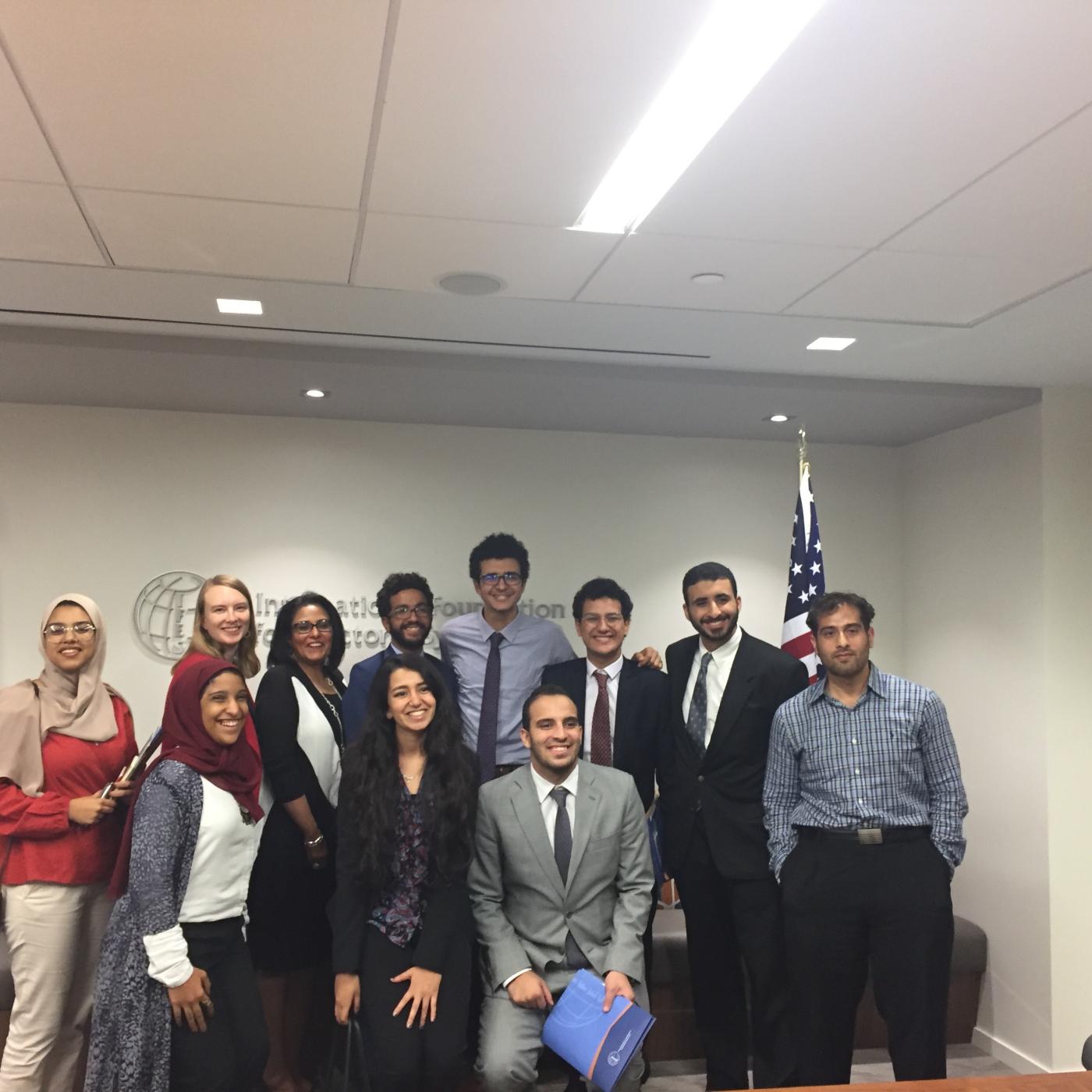Tools & Resources
Filter by
Type
Publication date
Language
Type
Publication date
Language
Election FAQ
Elections in Egypt: 2018 Presidential Election
Egyptians voted for their next president from March 26-28, while out-of-country voters went to the polls from March 16-18. These elections were the first conducted by the National Election Authority (NEA), which was established in 2017. To help you understand this important electoral process, IFES provides Frequently Asked Questions (FAQs) on Elections in Egypt: 2018 Presidential Election.
News & Updates
Feature
Egyptian Students Visit IFES as Part of ACYPL Exchange Program
On September 7, IFES hosted a delegation of eight Egyptian college students to discuss projects in Egypt and the Middle East and North Africa (MENA) region. Visiting the United States as part of the American Council of Young Political Leaders’ “Model American Congress” exchange program, the delegation took part in a question and answer session with President and CEO Bill Sweeney, MENA Regional Director Zeinab Abdelkarim, and IFES Egypt program staff.
News & Updates
Feature
Egypt’s National Council for Disability Affairs and IFES Host International Conference on Electoral Accessibility
The International Foundation for Electoral Systems (IFES) and Egypt’s National Council for Disability Affairs hosted a conference in Cairo on April 12 and 13, 2016 on electoral access for persons with disabilities, with over 180 participants in attendance.
Election FAQ
Elections in Egypt: 2015 House of Representatives Elections
On October 17, 2015, Egyptian citizens will head to the polls to elect members of the House of Representatives. The elections represent the final milestone of a transitional roadmap following the removal of former President Mohamed Morsi from office in July 2013.
News & Updates
Feature
President Bill Sweeney Reaffirms IFES’ Relationship with Egyptian Stakeholders
As Egypt prepares for parliamentary elections that will be held starting in March 2015, International Foundation for Electoral Systems (IFES) President and CEO Bill Sweeney traveled to Egypt to reaffirm IFES’ commitment to working with key Egyptian government stakeholders. At a reception held in Cairo on February 5, President Sweeney met with the spokesman of the High Elections Commission (HEC), Judge Omar Marwan, and Chairman of the State Information Service Ambassador Salah Abdel Sadek. They were joined by officials from the Ministry of Social Solidarity and Ministry of Transitional Justice; members of the diplomatic community, including representatives from the U.S. Embassy and U.S. Agency for International Development, and the Embassies of Switzerland, the United Kingdom, Australia, and the European Union; and representatives from the United Nations Development Programme and the Arab League.
News & Updates
Feature
Electoral System Changes in Egypt Spark Dialogue on Post-Revolution Future
On June 5, just a few days prior to the swearing in of the new President-elect, former interim President Adly Mansour ratified Egypt’s new parliamentary elections law, significantly altering the voting system established in 2011. In the former mixed system, two-thirds of representatives were elected through lists on the basis of proportional representation and one-third as individual candidates using the majoritarian system. The new law establishes what can be described as a dual-majoritarian system where 74 percent of representatives will be elected through the majoritarian system, 21 percent elected from closed, winner-take-all party lists, and 5 percent appointed by the president.
News & Updates
Feature
Roundtable held in Cairo on New Disability and Elections BRIDGE Module
The International Foundation for Electoral Systems (IFES) organized a roundtable in Cairo, Egypt as part of the development of the Building Resources in Democracy, Governance, and Elections (BRIDGE) training program. The new disability rights module is being developed along with IFES teams in Haiti and Indonesia. The session focused on identifying key issues regarding inclusion of people with disabilities in the electoral process. Participants from various disabled persons’ organizations (DPOs) in Egypt discussed ideas with IFES staff and curriculum developers.
Election FAQ
Elections in Egypt: 2014 Presidential Election
Egyptian voters will elect a new President over two days — Monday, May 26 and Tuesday, May 27 — as announced by the Presidential Elections Commission (PEC) in March 2014.
Publication
Report/Paper
Egypt's 2014 Presidential Election Law
The International Foundation for Electoral Systems’ (IFES) briefing paper Egypt’s 2014 Presidential Election Law provides expert insight into the legal framework that governs Egypt's upcoming presidential poll on May 26-27.
May 14, 2014
News & Updates
Feature
Ensuring Electoral Transparency and Integrity in Egypt: the Need for a Permanent, Independent Electoral Management Body
Egypt’s January 2014 constitutional referendum process faced heavy scrutiny. The much-watched poll took place amid an aggressive crackdown on political dissent following the ouster of President Mohamed Morsi in July 2013. Campaigning was largely in favor of approving a new constitution. The result of the referendum – which saw 98.1 percent voter approval with 38.6 percent voter turnout – was largely expected.





